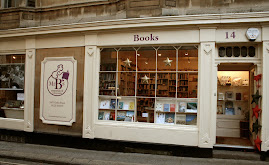
 Good weather prevails at
Good weather prevails atthe Marvellous Monday
book group. Sunshine
streamed in through
the windows -completely
at odds with the drizzly,
bleak landscape of
Georges Rodenbach's
Bruges-La-Morte.
This is a story of one man's
obsession with the memory of his dead wife and the novel explores deadness in many forms - including Bruges itself, the 'dead town entombed in its stone quais, with the arteries of its canals cold once the great pulse of the sea had ceased beating in them.' For a short novel, there was plenty to discuss and it produced some contrasting opinions.
When Hugues Viane leaves his solitary mourning period to begin a doomed affair with a dancer, it quickly becomes clear that far from moving on, he is simply projecting the memory of his dead wife upon another woman. Was Jane Scott insufficiently defined for us to understand her motivation for remaining in such an oppressive relationship? Or are we only allowed to see her through Viane's eyes: a doll to be dressed in the clothes of his dead wife?
We collectively failed to identify the specific elements of the novel that mark it out as a 'symbolist' work. Even wikipedia was opaque, naming Rodenbach as a key proponent of symbolism without actually defining the movement. One unusual feature of the original text, reproduced in the Dedalus text (Mr B's preferred edition) are the accompanying black and white photographs of Bruges every couple of pages. Moody, deserted and monotonous visions of canal paths and stone certainly contributed to the effect that Rodenbach was aiming for.
The effectiveness of Bruges as a malevolent force produced conflicting views. Everyone agreed that Rodenbach's language was often sublime but there was also a feeling that ultimately it was a less convincing evocation of place than, say Thomas Mann's Death in Venice. Given that Chris + Chris had just returned from Bruges (laden with handmade choccies and genuine Belgian beer - yum) we were intrigued to find out whether they recognised Rodenbach's Bruges.
Unsurprisingly, they didn't and had a fabulous time admiring the architecture and eating fantastic food. We discussed possible reasons for the conflict: have our attitudes to preserving pre-20th century buildings changed over time? Was Rodenbach looking at a town whose local economy had died and where medieval buildings were symbols of a lack of dynamism and progress? Has Eurostar significantly revived Bruges' economy? Certainly, Rodenbach doesn't fill his Bruges with Gourmands and cheery travellers - the shadowy locals are pious and restrained.
Overall, despite the bleak nature of the story, the feedback was more positive than negative - and everyone agreed that the protagonist was interesting...and repugnant. There was a desire to tell him in no uncertain terms to pull himself together; his obsessive behaviour was convincing; others noted the hypocrisy of his moral compass.
Next up is the achingly beautiful A Month in the Country by J.L. Carr. Thanks to Rachel for choosing an uplifting text: regardless of the forecast, our next meeting on the 9th May will be sunny.
P.S. A reminder that the Ulysses Support Group is meeting in the Salamander Pub on Tuesday 26th April. We're aiming to be up to page 111 by then.


No comments:
Post a Comment